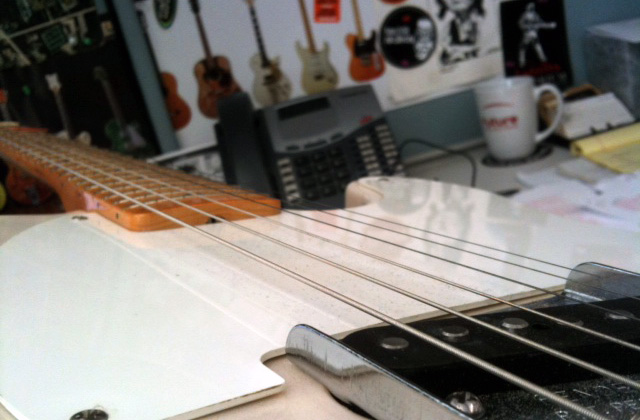When to Change Your Guitar Strings

Do you know the only time most guitarists change all their strings is when they break one? I know because I’m often guilty of that.
Changing strings isn’t always a matter of necessity; it can also be a matter of personal preference. Some musicians love the sound of their old strings broken-in, while others can’t live without the fresh sound of a new set. The truth is there is no hard and fast rule on when to change strings because it depends upon any number of factors from tonal preference to how physical your playing is—especially if you play often.
If anything, experience will tell you when to change them long before a string breaks. Here are some tell-tale signs to look for on when to change strings:
1. Are your strings rusty or discolored? If so, I can assure you breaking a string is only a matter of time. Sweat, oil, dirt and grime all contribute to corroding your strings along with constant playing and wear and tear (especially with tremolo equipped guitars). In fact, I know certain guitarists whose acidity on their hands can corrode strings within minutes. Even if your guitar sits in a case or outside on a guitar stand, your strings will eventually fade because of humidity or exposure. It’s time for a change.
2. Many will say that if your guitar has tuning problems, you should change your strings and I say, yes…kind of. Old strings are already stretched so tuning issues stem from other deteriorating factors like rust, scraped strings from pick attack, and grooves or pitting underneath the string above the fret from an aggressive fretting hand. Tuning issues could also have nothing to do with the strings themselves; it could be anything from bad tuners to a warped neck to an improperly cut nut and more. All of these or some can lead to bad tone, intonation issues, slippage, fretting out, and tuning problems. Don’t always blame the strings.
3. Does your guitar sound lackluster? If so, a new set of strings will brighten up the tone as well as making harmonics pop and chords chime. Not to mention, a new set will just feel smooth and lively underneath your fingers, making you more connected with your guitar.
To sum it up, if your guitar suffers from any or all of the three D’s (decay, duration or dullness); you should change your strings. Keep in mind, you can also prolong and protect the life of your strings with a bunch of great products like Dunlop Formula 65 string cleaner and conditioner.
Get The Pick Newsletter
All the latest guitar news, interviews, lessons, reviews, deals and more, direct to your inbox!
And if I might add, just try a new set of strings! You’ll be surprised at the various feel, sound and string-life of different brands.
Paul Riario has been the tech/gear editor and online video presence for Guitar World for over 25 years. Paul is one of the few gear editors who has actually played and owned nearly all the original gear that most guitarists wax poetically about, and has survived this long by knowing every useless musical tidbit of classic rock, new wave, hair metal, grunge, and alternative genres. When Paul is not riding his road bike at any given moment, he remains a working musician, playing in two bands called SuperTrans Am and Radio Nashville.
“A distinctive brightness that no other strings have been able to capture”: How Rotosound revolutionized the bass world with its Swing Bass 66 strings – and shaped the sound of rock music in the process
“It’s almost impossible for our machinery to make a bad string”: Jim D’Addario on the history, innovations and future of the world’s biggest string manufacturer – and its biggest-selling string sets








![John Mayer and Bob Weir [left] of Dead & Company photographed against a grey background. Mayer wears a blue overshirt and has his signature Silver Sky on his shoulder. Weir wears grey and a bolo tie.](https://cdn.mos.cms.futurecdn.net/C6niSAybzVCHoYcpJ8ZZgE.jpg)

![A black-and-white action shot of Sergeant Thunderhoof perform live: [from left] Mark Sayer, Dan Flitcroft, Jim Camp and Josh Gallop](https://cdn.mos.cms.futurecdn.net/am3UhJbsxAE239XRRZ8zC8.jpg)
